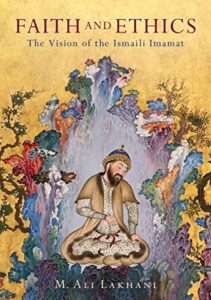Faith And Ethics:
The Vision Of The Ismaili Imamat
by M. Ali Lakhani
I.B. Tauris, London/New York, 2018.
Book Review by Reza Shah-Kazemi
This book is important for several reasons. First, as stated by the author himself, it is ‘the first extensive survey of the Aga Khan’s ideas’ (p.xxii). For the past sixty-four years the Aga Khan has led his community according to his understanding of the rich tradition of Ismaili Shia Islam. There are three key components here: Islam, the Shia branch of Islam, and the Ismaili branch of Shi’ism. How he has assimilated the principles of these three sources of his heritage, and how he has applied the principles of this tradition in the modern world, is what Ali Lakhani has admirably brought to light in his elegant exposition.
Secondly, Lakhani does far more than simply tell us about the Ismaili community and the ideas of its leadership. He does an excellent job in juxtaposing the creative principles of Tradition and the destructive aspects of modernism, understood qua ethos, as opposed to modernity qua the contemporary world (chapters 3 and 4). He unpacks, in less than thirty pages, the philosophical premises implicit in the Aga Khan’s swingeing critique of the modernist ethos, delivered at Évora University in Portugal, 12 February, 2006:
‘How, in an increasingly cynical time, can we inspire people to a new set of aspirations—reaching beyond rampant materialism, the new relativism, self-serving individualism, and resurgent tribalism?’ (p.56)
On the other hand, Lakhani also demonstrates with clarity and concision the ways in which the positive aspects of the contemporary world—its cosmopolitanism, for example (see chapter 4)—can be enhanced and calibrated by the universal principles so central to the Qur’anic revelation. He also shows how ‘living the ethics of Islam’ (chapter 9) allows not just the Ismaili community but all devout Muslims to integrate dīn (religion) and dunyā (the world) in such a manner as to embrace diversity and pluralism as an expression of their religious ethos. The faith-based ethics of Islam, in other words, engender a humanistic perspective which respects and reveres the intrinsic and inalienable dignity of every human being, irrespective of religion or race, ethnicity, or nationality. This perspective is in stark contrast to ‘materialistic modernism and hidebound tradition’—which are two sides of the same coin, in fact: both materialistic modernists and fanatical traditionalists have made an idol of their ideology, which they worship with the same spirit: a spirit compounded of exclusivism and intolerance of the Other. By contrast, as Lakhani reveals on page after page, the vision animating the Aga Khan’s indefatigable efforts on so many fronts—educational, cultural, artistic, architectural, environmental, charitable, humanitarian, etc—is to ‘replace walls which divide with bridges which unite’ (p.5) Instead of excluding and crushing the Other through ignorant antipathy, the Aga Khan makes a plea for us all to eliminate our fear of the Other through knowledge and empathy:
‘The danger is that knowledge gaps so often run the risk of becoming empathy gaps. The struggle to remain empathetically open to the Other in a diversifying world is a continuing struggle of central importance for all of us’ (p. 103).
Lakhani rightly insists that such empathy with, and cultural sensitivity to, the Other can only emerge out of what, in another speech, the Aga Khan refers to as ‘a deep intellectual commitment’. It is here, perhaps, that we can see Lakhani’s most important contribution to the articulation of ‘the’ vision of the Ismaili Imamat, and implicitly, of the Aga Khan himself. Throughout the book, Lakhani makes it blindingly evident that when the human intellect is inspired by the deepest wellsprings of Islamic faith, it will be governed by the highest ideals of virtue, embracing the whole of humanity with a love which engenders hope and banishes fear:
‘This reversal from fear to hope is rooted in individuals, in the leadership that they provide to the overall impact of civil society. Governments and institutions must create an Enabling Environment in which hope can flourish. But the actual process of replacing fear with hope rests with every individual in his or her society’ (pp.148-149).
Speech at the Graduation Ceremony of Aiglon College,
Chesières, Switzerland, 21 June, 2014.


